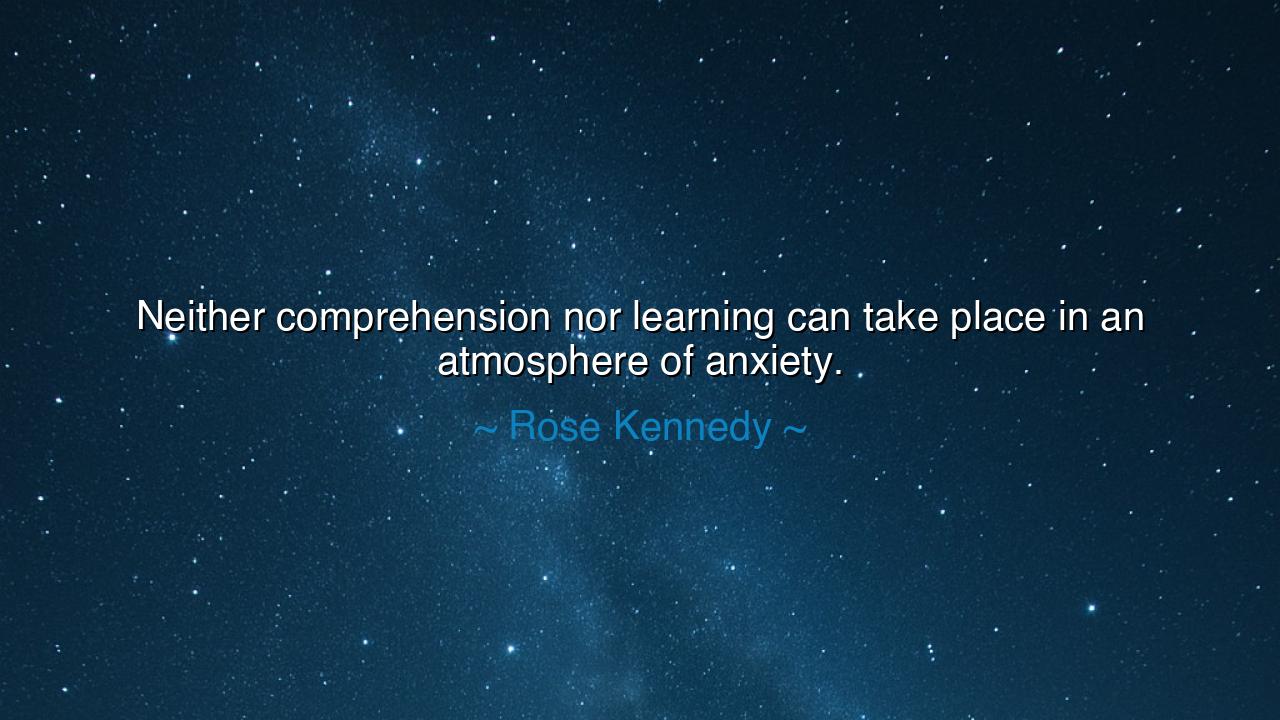
Neither comprehension nor learning can take place in an






“Neither comprehension nor learning can take place in an atmosphere of anxiety.” — Thus spoke Rose Kennedy, the matriarch of one of America’s most storied families, a woman whose life was marked by both triumph and tragedy, wisdom and endurance. Her words, gentle yet profound, reveal a truth known to both sages and teachers through the ages: that the mind cannot open where the heart is trembling. True learning — the kind that transforms the soul — requires peace, trust, and the freedom to explore without fear. Where anxiety reigns, curiosity dies; and where fear rules, wisdom flees.
To understand this teaching is to see the delicate nature of the human spirit. The mind is not a machine that absorbs knowledge through force; it is a living garden that blooms only under the warmth of safety and the light of encouragement. Anxiety — the cold wind of fear, judgment, and pressure — withers the roots of thought before they can grow. A person who learns under fear learns only how to survive, not how to understand. For comprehension, as Kennedy reminds us, is born not from tension but from tranquility, not from compulsion but from confidence.
Rose Kennedy knew this truth through experience. As the mother of nine children, she was both a nurturer and a teacher. She observed that her children — some destined for greatness, others for heartbreak — thrived when they felt secure, but faltered under the weight of expectation. She understood that human potential unfolds not under the glare of anxiety, but in the calm of trust. Her words are not the musings of theory, but the wisdom of a mother who saw how fear can cripple a child’s mind, and how love can set it free. In her view, to educate was not to command, but to inspire — to create a space where the learner’s heart could be still enough to truly receive.
Throughout history, this truth has echoed in the hearts of great teachers. Consider the philosopher Socrates, who taught not through lectures or intimidation, but through gentle questioning — the art of dialogue. He created not an atmosphere of fear, but of curiosity, where his students could think aloud without judgment. It was this freedom that allowed his pupils to reach deeper understanding, not merely memorization. Likewise, the Buddha, in his teachings, warned that a restless and anxious mind is like a churning lake — it cannot reflect the moon of truth until it becomes still. Thus, comprehension and learning are not acts of power, but of peace.
Yet this lesson is not confined to classrooms. It belongs to the very art of living. In our modern world, many seek success under the tyranny of anxiety — rushing, competing, fearing failure at every step. But just as a frightened student cannot learn, a fearful soul cannot grow. Anxiety clouds judgment, narrows perception, and drains the joy from discovery. Those who live in constant tension may achieve much, yet understand little; they may gather facts, but lose wisdom. For wisdom requires the stillness of an untroubled heart — a heart open enough to listen, to observe, to feel.
Rose Kennedy’s insight also teaches compassion — especially for those who lead and teach others. A good teacher, a wise parent, a thoughtful leader — all must learn to cultivate calm, not command through fear. A single word of encouragement can awaken courage where criticism would have crushed it. The great sculptor Michelangelo once said that he saw the angel in the marble and carved until he set it free. So too must we see the potential within others and create the conditions for it to emerge — through patience, trust, and peace.
So, my child, if you would truly learn, or help another to learn, first quiet the storm within. When you study, do so not with panic but with curiosity; not with fear of failure, but with love of growth. When you teach, speak not to dominate, but to invite understanding. When you lead, do not sow anxiety, but confidence. Remember always that the soil of the mind needs gentleness — that ideas, like seeds, cannot take root in trembling hands.
For in the end, as Rose Kennedy teaches, anxiety imprisons the mind, but peace sets it free. To comprehend is not to conquer, but to connect — to meet truth with calm awareness. The learner who cultivates peace within finds that understanding comes naturally, as dawn follows night. Let this be your practice, then: when anxiety arises, breathe, and remember that wisdom cannot be forced — it must be allowed to unfold. For only in the stillness of a peaceful heart can the light of learning truly shine.






AAdministratorAdministrator
Welcome, honored guests. Please leave a comment, we will respond soon